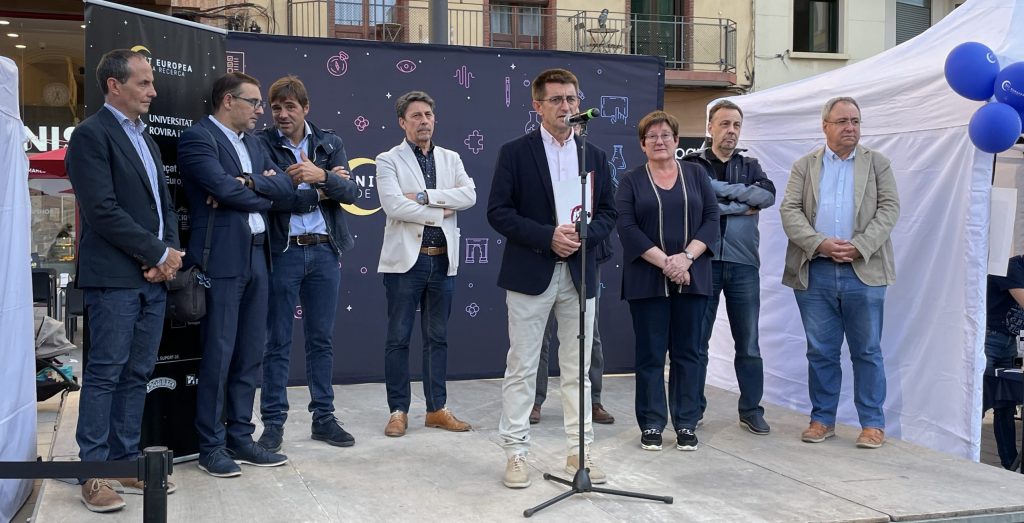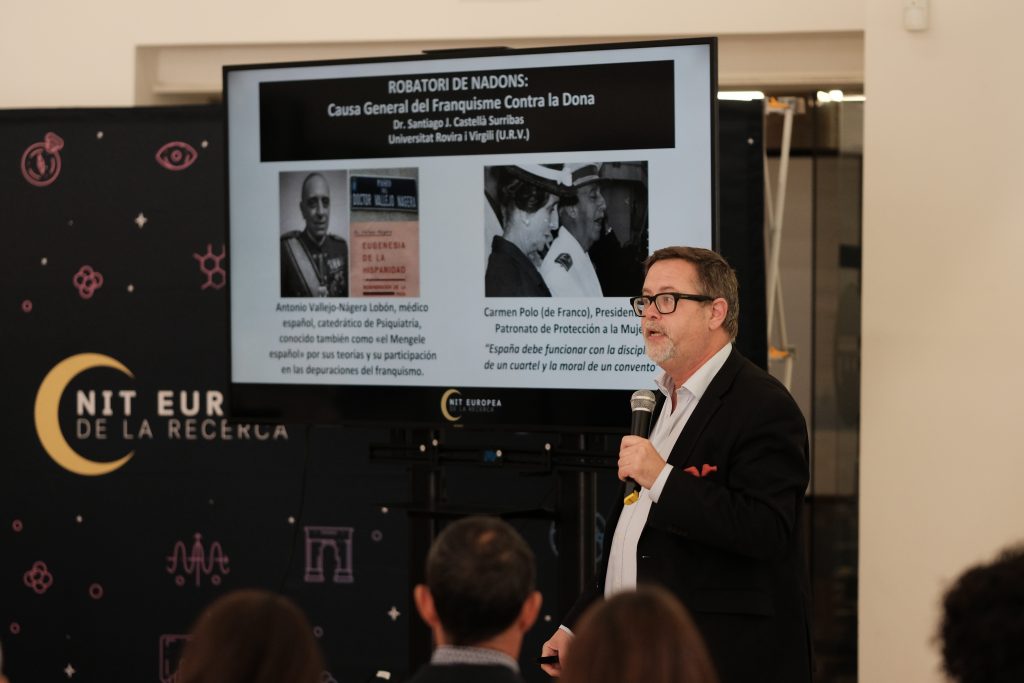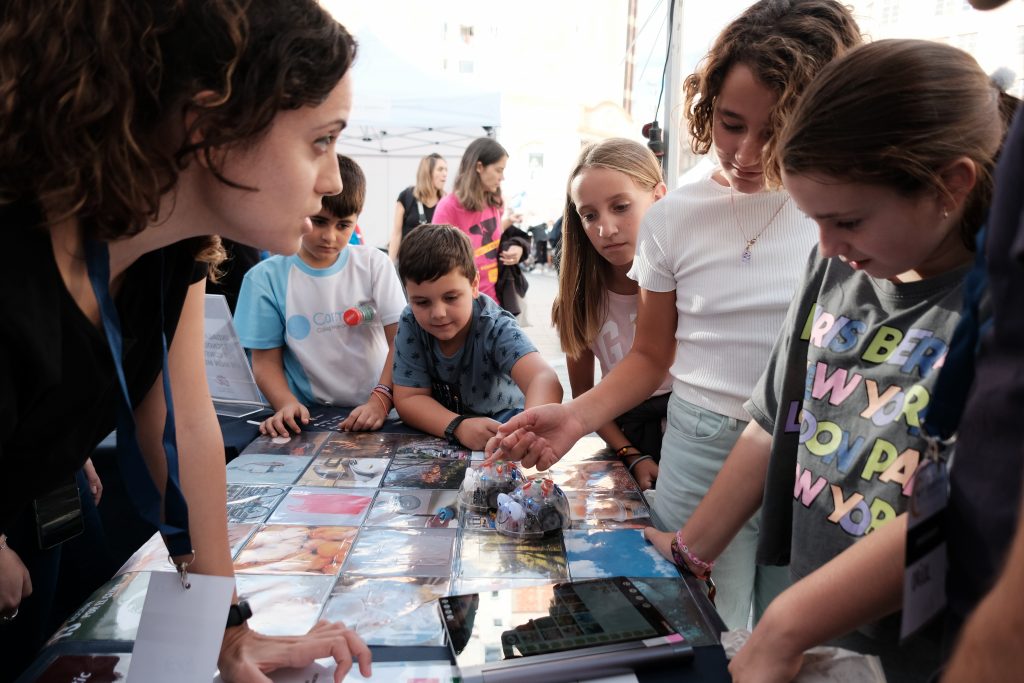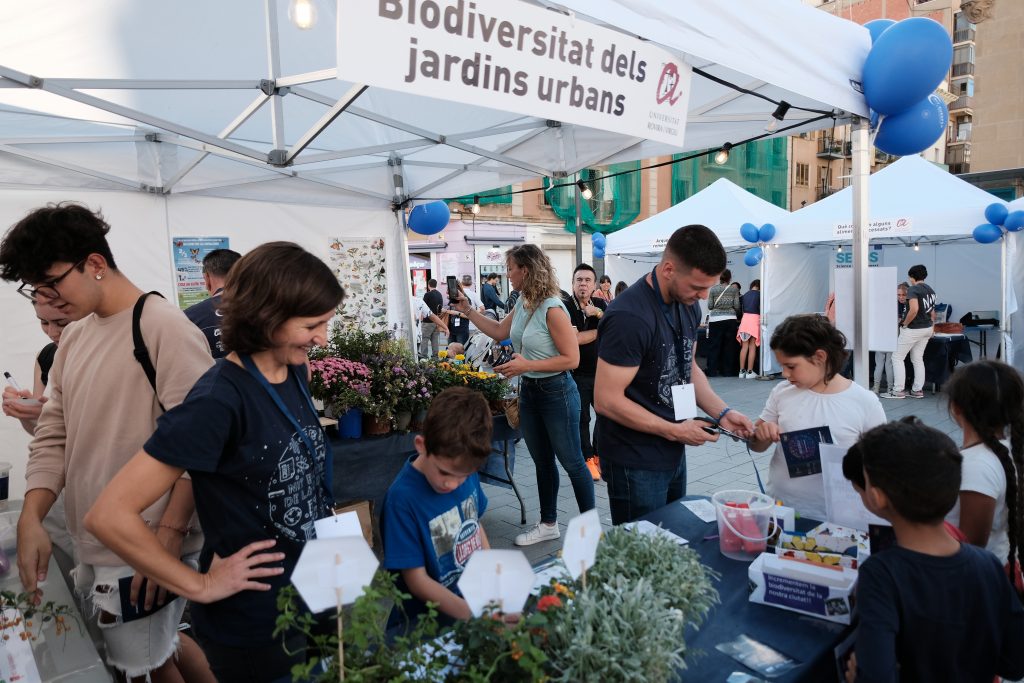03/10/2022
The European Research Night science workshops attract more than 2,500 people to Plaça Corsini
The informative workshops in Reus and the Antoni de Martí i Franquès scientific tour of the city complete a weekend devoted to scientific communication.

The informative workshops in Reus and the Antoni de Martí i Franquès scientific tour of the city complete a weekend devoted to scientific communication.
The science workshops of the European Research Night filled the Plaça Corsini for almost five hours. More than 2,500 people walked around the forty or so stalls that URV researchers and research institutes set up with the aim of explaining scientific concepts to the families who attended. This is the central activity of Research Night, now in its fifth consecutive year and already a benchmark for scientific communication in the city. This year it has beaten all records, both in terms of attendance and number of workshops. In addition to this activity, throughout the previous week, workshops were held at secondary schools throughout the region; on Saturday, the Antoni de Martí i Franquès scientific tour of the city was sold out, and more than 50 people attended the session of micro-workshops in Reus.
With the slogan “Research for change”, the workshops in Plaça Corsini clearly explained scientific concepts from almost all disciplines: chemistry, archaeology, environment, health, art, biochemistry, engineering, psychology, history, nutrition, communication and architecture. The researchers prepared short, highly interactive workshops that attracted hundreds of children, who went from workshop to workshop in a unique opportunity to come into direct contact with the research community through these fun activities.
Discovering which animals the bones found at archaeological sites belong to, finding out which plants help to maintain the biodiversity of urban spaces, discovering works of medieval art, learning about the benefits that eating insects can bring to the organism and the planet, and identifying and differentiating microplastics are just some of the activities that captured the public’s attention. The workshops ran continuously from 4.30 p.m. to 9 p.m. on a fun and festive day with science as the main theme.
The rector of the URV, Josep Pallarès, and the councillor for Education of Tarragona City Council, Manel Castaño, officially opened the main event of the European Research Night, highlighting the importance of bringing science out of laboratories and offices and explaining it to society. The Rector also pointed out that the research community was motivated to make dissemination activities of this type possible and paid special tribute to the researcher Miquel Guardiola from the IPHES, who died recently and who, like every year, had planned a workshop in Plaça Corsini. Also present were representatives of the research institutes that collaborate with the event: the Catalan Institute of Classical Archaeology, the Catalan Institute of Chemical Research, the Pere Virgili Institute of Health Research and the Institute of Human Palaeoecology and Social Evolution, as well as the Catalan Minister of Trade, Fairs, Markets and Consumer Affairs, Dídac Nadal.

In parallel to the workshop fair, and in collaboration with the Fundació La Caixa, a session of scientific micro-talks was held at the CaixaForum Tarragona.
Pre- and post-session activities for all audiences
On Saturday, after the main event, a session of nine informative micro-talks was held at the Xavier Amorós Library in Reus, coordinated by the IISPV, and Tarragona organised the Antoni de Martí i Franquès scientific tour of the city. Also, at the CaixaForum Tarragona, there was a research fair with activities and demonstrations on Saturday morning, organised by Fundació La Caixa.
The week before Research Night, more than twenty lectures and workshops were given in secondary schools and colleges by researchers from the URV and IPHES, which will continue this week. To complete the informative activities of Research Night, there is an exhibition on Science and Human Towers at the Central Market which has been open to the public since September.

A joint project in Catalonia
El projecte de la Nit Europea de la Recerca és possible gràcies al cofinançament del programa de recerca i innovació Horizon Europe de la Unió Europea, i a la col·laboració del consorci format per la Universitat Rovira i Virgili, que coordina el node de Tarragona, la Universitat de Girona (UdG), entitat coordinadora del projecte i del node de Girona, la Universitat de Barcelona (UB) i l’Institut de Salut Global de Barcelona (ISGlobal), entitats coordinadores del node de Barcelona, la Universitat de Lleida (UdL), coordinadora del node de Lleida, i la Universitat de Vic – Universitat Central de Catalunya (UVic), coordinadora del node de Catalunya central. L’Associació Catalana de Comunicació Científica (ACCC) s’encarrega de la coordinació dels diferents nodes. Aquest projecte conjunt coordina investigadores i investigadors de més de 50 entitats científiques de tot Catalunya, i es fa cada any a més de 300 ciutats de 30 països d’Europa alhora.. En aquesta cinquena edició, a més, s’hi afegeix la Fundació Jaume Bofill, que en el marc del programa Magnet, impulsarà 15 projectes de recerca a centres educatius de primària i secundària per tal d’apropar els equips de recerca a l’alumnat, famílies i veïnats, al llarg de l’any.
The European Research Night has been made possible by the co-funding of the European Union’s Horizon Europe research and innovation programme, and the collaboration of the consortium formed by the Universitat Rovira i Virgili, which coordinates the Tarragona node, the University of Girona (UdG), the coordinator of the project, and the Girona node, the University of Barcelona (UB) and the Barcelona Institute for Global Health (ISGlobal), coordinators of the Barcelona node, the University of Lleida (UdL), coordinator of the Lleida node, and the University of Vic – Central University of Catalonia (UVic), coordinator of the Central Catalonia. The Catalan Association of Scientific Communication (ACCC) is in charge of coordinating the different nodes. This joint project involves researchers from more than 50 scientific institutions from all over Catalonia, and is carried out every year in more than 300 cities in 30 countries around Europe at the same time. For this fifth edition, the Jaume Bofill Foundation has joined the event, which, as part of the Magnet programme, will organise 15 research projects in primary and secondary schools so that research teams can come into contact with students, families and local residents over the year.


